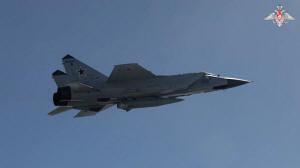Russia begins second stage of tactical nuclear weapon drills with
Belarus
 Send a link to a friend
Send a link to a friend
 [June 11, 2024]
By Guy Faulconbridge [June 11, 2024]
By Guy Faulconbridge
MOSCOW (Reuters) -Russia said on Tuesday its troops had started the
second stage of drills to practice the deployment of tactical nuclear
weapons alongside Belarusian troops after what Moscow said were threats
from Western powers.
Russia says the United States and its European allies are pushing the
world to the brink of nuclear confrontation by giving Ukraine billions
of dollars worth of weapons, some of which are being used against
Russian territory.
Since sending thousands of troops into Ukraine on Feb. 24 2022,
President Vladimir Putin has repeatedly said Russia could use nuclear
weapons to defend itself in extreme situations, comments that the West
has dismissed as saber-rattling.
Russia last month explicitly linked the nuclear drills ordered by Putin
to what it said were "provocative statements and threats by certain
Western officials against the Russian Federation".
In the first stage of the drills, Russian troops trained how to arm and
deploy Iskander missiles, while the air force trained how to arm Kinzhal
hypersonic missiles.
The second stage, announced on Tuesday, involved working out joint
training of Russian and Belarusian units "for the combat use of
non-strategic nuclear weapons", the defense ministry said.

"The situation on the European continent is quite tense, which is
provoked every day by new decisions and actions of European capitals
hostile to Russia, and above all by Washington," Kremlin spokesman
Dmitry Peskov said when asked about the drills.
"Therefore, of course, such exercises and maintaining combat readiness
are very important for us."
In footage released by the defense ministry, an Iskander missile system
was shown being driven into a field and the missiles were raised. Also
shown were MiG-31 supersonic interceptors carrying Kinzhal missiles, and
Tupolev Tu-22M3 long-range supersonic bombers.
Putin said on Friday Russia had no need to use nuclear weapons to secure
victory in Ukraine, the Kremlin's strongest signal to date that Europe's
deadliest conflict since World War Two will not escalate into a nuclear
war.
Putin also said he did not rule out changes to Russia's nuclear
doctrine, which sets out the conditions under which such weapons could
be used.
[to top of second column]
|

A Russian MiG-31 fighter jet equipped with a Kinzhal hypersonic
missile flies during the second stage of tactical nuclear drills of
the armed forces of Russia and Belarus at an undisclosed location,
in this still image from video released June 11, 2024. Russian
Defence Ministry/Handout via REUTERS

NUCLEAR RISKS
The United States says it has seen no change to Russia's strategic
posture, though senior intelligence officials say they have to take
Moscow's remarks about nuclear weapons seriously.
Russia and the United States are by far the world's biggest nuclear
powers, holding about 88% of the world's nuclear weapons, according
to the Federation of American Scientists.
"Tactical nuclear weapons" are designed for use on a battlefield, so
they are generally less powerful than strategic nuclear weapons,
which could destroy entire cities.
The United States has about 100 non-strategic B61 nuclear weapons
deployed in five European countries - Italy, Germany, Turkey,
Belgium and the Netherlands, according to the Bulletin of the Atomic
Scientists. The U.S. has another 100 such weapons within its
borders.
Russia has about 1,558 non-strategic nuclear warheads, though arms
control experts say it is very difficult to say just how many there
are due to secrecy.
Putin said last week that many of Russia's tactical nuclear weapons
were 70-75 kilotons of explosive power - around five times the size
of the U.S. nuclear bomb dropped on the Japanese city of Hiroshima
on Aug. 6, 1945.
A senior White House aide said last Friday that the U.S. might have
to deploy more strategic nuclear weapons in coming years to deter
growing threats from Russia, China and others.
(Reporting by Reuters; editing by Guy Faulconbridge, Andrew Heavens,
Angus MacSwan and Gareth Jones)
[© 2024 Thomson Reuters. All rights reserved.]This material
may not be published, broadcast, rewritten or redistributed.
Thompson Reuters is solely responsible for this content.
 |